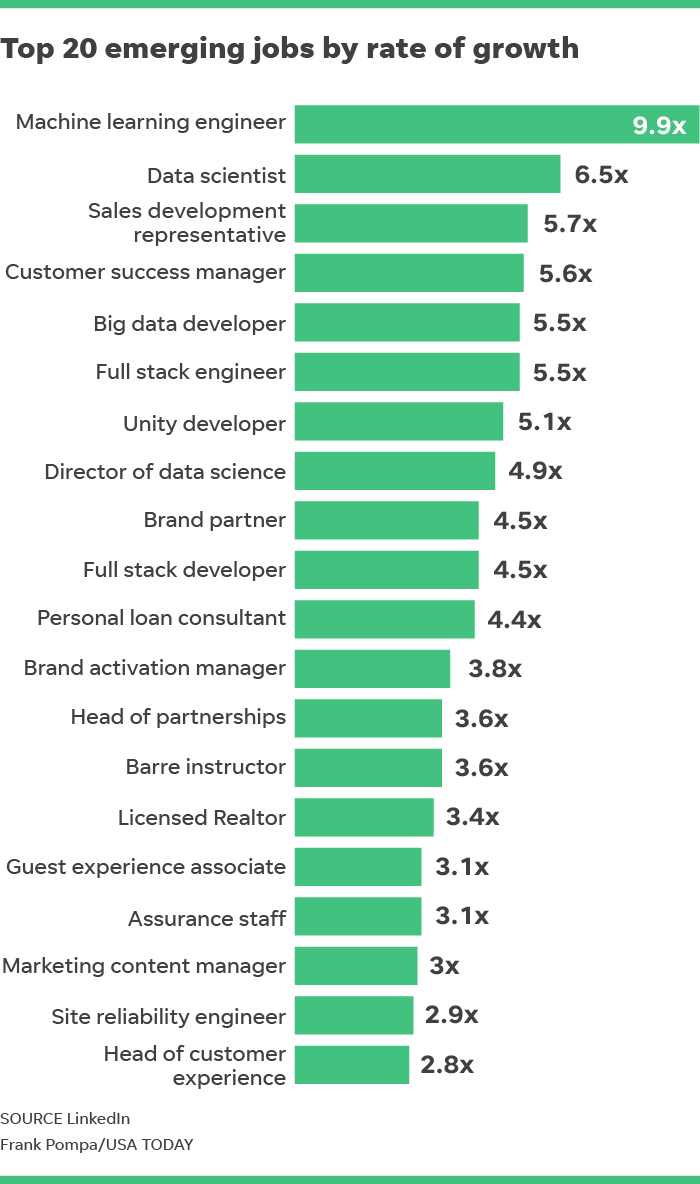Daniel B. Kline, The Motley Fool, USA TODAY
Image from article, with caption: Many emerging jobs involve technologu
While the job market undergoes massive technology-driven changes, the focus generally falls on all the positions that will be eliminated by automation. What gets less attention is that while some industries will get wiped out by technology, many others will rise because of it.
In fact, the United States Bureau of Labor Statistics (BLS) expects growth in the next decade to exceed growth in the previous one with 11.5 million jobs being created by 2026. Many of these jobs are in areas that are still emerging and the BLS data shows that "65% of children entering primary school today will ultimately hold jobs that don't yet exist," according to data shared in LinkedIn's 2017 Emerging Jobs report.
Which jobs are emerging?
LinkedIn, which is now owned by Microsoft (NASDAQ: MSFT), analyzed data from the last five years on its own platform as well as survey data "to identify which jobs and skills are on the rise, what they're replacing, and what these trends indicate about the jobs market in the years to come." The social media platform found that technology is king with tech-focused positions seeing increased demand across tech-focused and non-tech-focused companies.
In addition to finding -- perhaps not so surprisingly -- that most emerging jobs involve technology, the LinkedIn study revealed a number of other things.
- Soft skills matter: Some emerging jobs may involve the tech space, but not actually require a technology background. For example, sales and marketing jobs have taken on new forms but "traditional soft skills like communication and management underpin all of these emerging jobs," according to the report.
- Jobs demand changes with the times: The report also found that some emerging jobs reflect broader trends in society including wellness, flexibility, and location mobility.
- There are not enough qualified workers: In a number of emerging job areas, the demand far exceeds the pool of workers.
One of the trends clear in these results is that jobs that require a variety of skills are in higher demand. LinkedIn also found that some specialized jobs have seen demand shrink.
"From specialized developer roles, to legal specialists, and even specialized logistics roles, we are seeing these roles be replaced in favor of more comprehensive skill sets and job titles," the report explained.
What can you do?
The most important thing anyone in the U.S. workforce can do is continue to make sure their skills fit the changing needs of the job market. In some cases that might mean tweaking your current skill set or even just learning enough so you can bring your needed skills to a new company.
In other cases, though, workers are going to need to be completely retrained as jobs are lost to automation. For example, a taxi driver and a retail clerk both have a certain level of customer service experience that may serve them well in a sales or marketing role, but training is needed (at least for most people) to make that leap.
The other challenge for workers is that while some jobs offer location flexibility many of the emerging positions in the technology space are highly concentrated in the 10-most-populated metropolitan areas, according to LinkedIn. That means that in many cases getting the skills is only part of the equation and being willing to move may be required as well.
In addition, freelance work is driving more growth than traditional 9-to-5 jobs. That's not just people piecing together side gigs to barely get by. LinkedIn found that 20% of freelancers said they will make six figures this year solely from freelance work.
What's clear beyond anything else is that willingness to learn and flexibility will be even more valuable over the next decade. Jobs are changing and workers need to embrace that or they will be left behind.
Teresa Kersten is an employee of LinkedIn and is a member of The Motley Fool's board of directors. LinkedIn is owned by Microsoft. Daniel B. Kline owns shares of Microsoft. The Motley Fool has no position in any of the stocks mentioned. The Motley Fool has a disclosure policy.


No comments:
Post a Comment